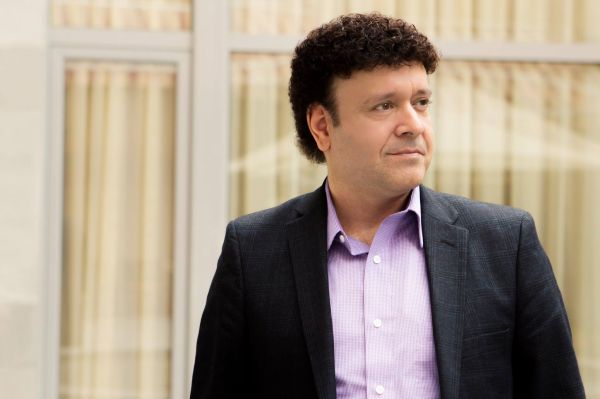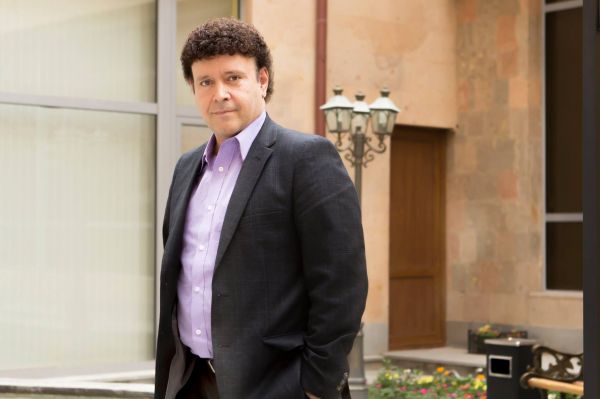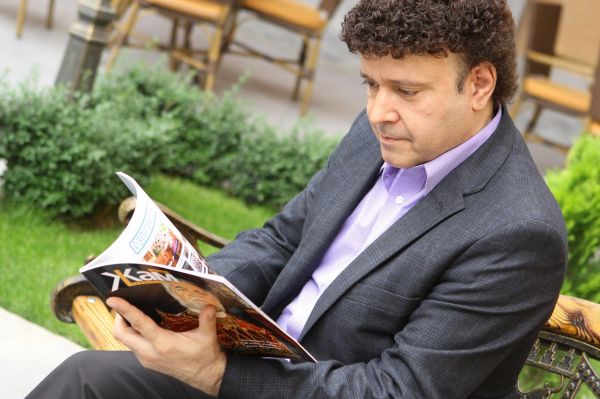Armenian by choice in Armenia for heart
An Armenian by choice, a dedicated musician and humanist Daniel Deckeryan, how he signed on his Armenian album, a citizen of Armenia, has come home to support his favorite nation in this time of changes, prepare for a concert and seal his cooperation with the Armenian music by writing a song about river Araks.
— I am familiar with «Zham» thanks to some of my Armenian friends. They told me about the magazine. I haven't read it yet, but now I hope to get acquainted.
— As a person, I always look for meaning, ways how I can make a positive difference in the world. Music plays a very important part of who I am – it's embedded in my character, it's wolven deep into my soul. My faith and my morality guide my decisions and the direction of my life.
— Yes, even from the very young age music has been a very big part of my life. And in those rare times when music was not present, or I was not making music, it was like something was missing.
— Usually a melody or some kind of musical sequence comes first; but only occasionally – a verse. My inspiration comes from looking at the stars in the sky, seeing a waterfall – anything that's majestic or gives you the sense of wonder- it could be a great movie, it could be a painting. Seeing a person do something heroic can be very inspiring too. Inspiration comes from so many different areas.
— It happened more than fifteen years ago. I heard some recording being played; I had never heard anything like it before. The melody was called «Mush» , and as soon as I heard the melody, my first reaction was «Wow, that is amazingly beautiful»! And my second thought was that I wanted to write lyrics to that melody. And in order to do it I needed to find the author. I found out that it was written by a composer named Ara Gevorgyan. I learned that he was in Armenia, and I was able to track him down across the ocean. I contacted him, introduced myself and proposed that we collaborated on this song – that was the beginning of my friendship with him and the beginning of my journey to becoming Armenian.
— There's more than one aim. To the Armenians – it's a means to encourage Armenians to be proud of their heritage and who they are, to give them the sense that there are others who stand with them. As I got to know the Armenian people over the years, there's this sense of pain and sorrow that runs through Armenian history, culture and life in general. And I always felt the call to try to be a means of encouragement – «Adana» was a way to tell a terrible story, but my aim was to offer a sense of hope and healing for Armenians through the lyrics.
To the non-Armenian, it's a way of saying «Here's this amazing country that you have never heard about, and I want to tell you, because you need to know». And my songs say «Listen, this is the forgotten genocide, and we need to change that, so I’ m going to tell you the story, and I'm going to tell the others the truth about what happened, because by sharing this truth we can ensure that this never happens again». Even with my Armenian CD is a way of introducing them to this fantastic culture. Armenians know this culture, they live it, they were born in it, and lived their lives through it – they know it, still it's a mystery to the non-Armenians. I try to leave the curtain and say «Look! Listen! Experience the wonder of Armenia!»
— There are three specific goals that I am working on here. First was to stand by the Armenian people during this crisis with Karabagh. When I first learned about it, it really upset me. I know Armenia is a peaceful country, and they don’t seek war- they want to live in freedom, they want to live in peace without the fear of enemy attacking them. And that is exactly what happened – they were attacked. And the propaganda war was all about Azerbaijan protecting their right to reclaim their land, but that’s false propaganda, that is not the truth. When the crisis spread, I issued a statement to the media, notifying the unaware people what the conflict was about, and expressed my support for the Armenian people and their right to protect their land. I am here to say «I am with you».
The second aim is related to my music. I am writing a song with Ara Gevorgyan about the river Araks. It is a symbolically important river for Armenia. The story of Araks in some sense tells the Armenian story, and one of the points in my song is that the river Araks is not free now, because her people, the Armenian people, can only walk on one side of its shores. And there is a hope and a dream that one day Armenians will walk freely on both sides of the river. This song is patriotic and romantic, and very special. We have been working on it during my stay here.
Besides this, I am organizing a concert in October here in Yerevan. I will be singing only in the Armenian language, with Armenian folk instruments. And because during this time of tension I wanted to do something to uplift the Armenian spirit, to be patriotic, to be proud of your heritage , for who you are, and now, that I am a citizen of Armenia, I am coming home to embrace Armenian culture with the rest of the nation.
— I find Armenians to be very passionate, very rich in culture, history, language. Growing up in America, we talk about American history going back to the 1700s, Armenian history goes back thousands of years. So, in comparison, America is like an infant. The Armenian character is very strong – amidst everything that Armenia has endured, they persevere and keep going. And that is something to be admired. For such a small country, they are rich in the arts- painters, musicians, writers- some of the most gifted people I have ever met are Armenians.
— I am most acquainted with the capital, of course. I have been to many other places – I love Khor Virap because this is where Christianity was introduced to Armenia, and it is also the place near the border, where you have such a clear view of Ararat – the symbol of Armenia. I have visited river Araks, I have been to Garni-Geghard. This week I am going to Dilijan. It’s hard to say which my favorite place is, because there is so much to love about Armenia, so I am not sure that I can rank them. But of course I love Yerevan – I love the activity that’s here, the energy that’s here. I have more friends in Yerevan alone than in all the United States.
— I think these are some of my earliest experiences with music in my teenage years, because they were so important to me. I was always the kind of person who, if someone told me that I couldn't do something, it made me want to do them more. I experienced that in high school, where there were those who discouraged me from singing. And it made me want to do it even more. That is translated throughout my career. Even in my journey into Armenian music and Armenia, there were those who said that I could not sing Armenian, that it was impossible, because I am not Armenian – I didn't speak the language – «You can't feel our pain. What we feel, is Armenians». That just made me want to try even more. I don't know if it is being stubborn or being determined, or maybe a little bit of both, but those times in my life pushed me. In terms of achievements, I think that one time that stands apart in my life is writing the lyrics to the song «Adana» about the Armenian Genocide.
— More and more my focus has been on my relationship to Armenia, and in what I can do to help Armenia to move forward in this time of change in the Armenian life. I feel passionate introducing non-Armenians to Armenian culture, as well as helping Armenians here and in the Diaspora to work together, to stand together with one voice. Armenians are spread across the world, which creates division. I think it is very important for Armenians to unite their voice behind the genocide and other critical issues related to Armenia, and in doing this their voice will be stronger.
— In addition to the Armenian music, I compose music for the piano, and I hope to release an album of solo piano recordings in the next year or so. One of my aspirations is to compose a film music.
— I wish you to continue success. I have heard many wonderful things about it. In this media age, when everything is moving toward Internet, you provide a very valuable resource that I think we need to encourage to thrive and to grow.
Intervew: Ani Vardanyan


